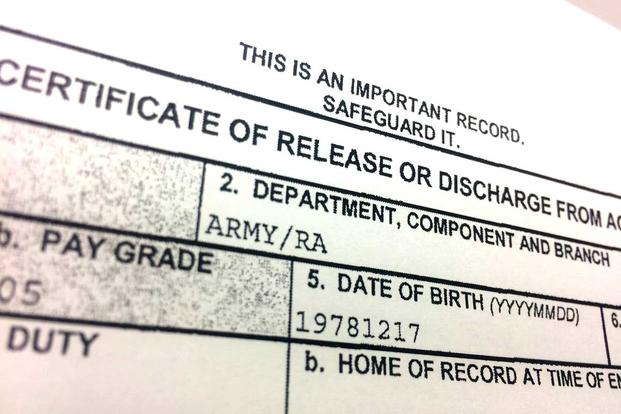From healthcare to home loans, education to employment, nearly every veteran benefit starts with one document: Your DD214.
What Is a DD214 Form?
Your military discharge papers are officially known as DD Form 214, or just DD214. All veterans receive this Certificate of Release or Discharge from Active Duty once they are out of the military.
In a nutshell, the DD214 is proof of your military service. All branches use this same form. There may be no more important document, as it serves as the key to unlocking benefits of all kinds.
Treat your DD214 like gold, as this piece of paper is vital to many aspects of your life in the civilian world.
The DD214 -- DD stands for Defense Department -- provides veterans with an accurate and complete summary of their active military service. It usually lists dates of service, any commendations or medals received, the reason for separation and the type of discharge.
Related: Dishonorable Discharge: Everything You Need to Know
You are entitled to your military records free of charge, unless for whatever reason, you simply prefer to pay someone to help you obtain them. Be aware of advertisements that claim you have to pay to get your DD214, or that they can get it more quickly (they can't).
Information the DD Form 214 May Include
- Active-duty information, including entry date
- Place of entry into active duty
- Home address at time of entry
- Mailing address after separation
- Last duty assignment and rank obtained before getting out
- Military occupational specialty (MOS)
- Military education
- Decorations, medals, badges, citations and campaign awards
- Service length
- Any foreign service
- Separation information (type, character of service, authority/reason for separation, eligibility codes
Why Is a DD214 Important?
This separation document contains information normally needed to verify military service for benefits, retirement, employment and membership in veteran organizations.
This form also gives civil and government agencies the information needed to apply any federal and state laws relevant to members who separate from the military.
A DD214 generally is needed for the following:
- Home loans
- Civilian employment
- Veteran organizations membership
- Social Security
- Burial/flag
- Education
- Homeless veteran services
- Medical services
- Deals and discounts for veterans (sometimes)
The Department of Veterans Affairs (VA) uses the form to determine eligibility for specific benefits.
The Department of Labor uses DD214 to determine eligibility for unemployment compensation. Additionally, the form will be used to determine reemployment rights. Inaccurate information on the DD Form 214 could result in a delay or denial of benefits.
The surviving spouse of a military veteran also needs to know how to access the DD214 in order for the service member's funeral service to receive patriotic honors. These include the folding and presentation of the United States burial flag; and the sounding of taps, at no cost to the family.
Related: Why Your DD 214 Form Is Vital to Landing a Civilian Job
How to Get Your DD214
There are several ways to request a copy of your DD214:
- Via the federal government's eVetRecs website.
- Visit the VA website for instructions on how to access your records via milConnect.
- By mail: Download the Form SF 180 here -- the Request Pertaining to Military Records -- and mail it to the National Personnel Records Center (NPRC) at 1 Archives Dr., St. Louis, Missouri 63138. (Detailed instructions on the Form SF 180 can be found here.)
- By fax: Fax the completed Form SF 180 to the NPRC at 314-801-9195.
- Visit the National Personnel Records Center in person.
- Contact your state or county veterans agency (click here to search for a VA facility near you).
- Hire an independent researcher.
Your request may take 4-6 weeks or longer.
What Is the Fastest Way to Get a DD214?
To receive a DD214 as quickly as possible, visit the eVetRecs website and, as you go through the dropdown menus, select "Emergency Request" in the dropdown menu under: "Which of these categories best describes why you're requesting the records?" You won't see this option until you begin going through the records request process and get to the "Service and request details" section.
You may also fax a record request using Form SF 180 to the National Personnel Records Center (NPRC) at 314-801-9195. Make sure to specify the emergency in the "Purpose" section of Form SF 180 before faxing it. If you have any questions, you may call 314-801-0800, but note that hold times can be long.
Related: Requesting Military Personnel Records
Why You Should Keep Your DD214 as Private as Possible
The DD214 includes personally identifying information that could put you at risk for identity theft. Someone with nefarious intent could apply for a credit card in your name or otherwise try to impersonate you.
"Identity thieves could use your personal information to obtain fraudulent credit, identification cards and other items," according to the U.S. Army's Human Resources Command. "To protect yourself, treat your documents as you would a valuable personal possession. Store your documents only in a safe location not accessible to strangers."
Should I File a Copy of My DD214 at the Courthouse?
Over the years, experts have suggested that veterans file a copy of their DD214 at their local county courthouse, in order to make it easily accessible should the need arise.
However, before taking such a step, consider there may be a risk of identity theft if your DD214 would become publicly available, as many court records are.
Many municipalities have taken steps to ensure the privacy of veterans' records, either by preventing the general public from accessing discharge papers, or by blacking out some identifying information. So do your research before filing a copy of your paperwork at the courthouse.
Know All Your Legal Rights and Benefits
Be aware and get what you are entitled to. Keep up with all the legal benefits available to you as a service member, veteran or spouse and get updates delivered straight to your inbox by subscribing to Military.com.












